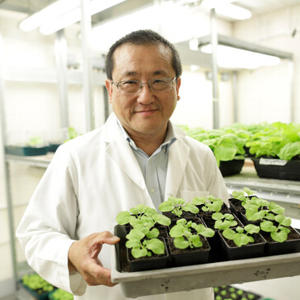Published: 29 March 2023

Professor Julian Ma has been awarded over £140,000 to collaborate with Ukrainian colleagues to help find new ways to fight antimicrobial resistance (AMR).
The UK-Ukraine Research and Innovation twinning grant, funded by Research England and awarded through Universities UK International, will enable scientists at St George’s, University of London and The Ivano-Frankivsk National Medical University (IFNMU) in Ukraine to capitalise on their expertise in infection and AMR.
The team at St George’s have recently produced a type of anti-bacterial protein, called ‘bacteriocins’, cheaply on a large scale using plant-based biotechnology. They now believe these plant-derived bacteriocins could be produced more extensively and used in addition, or as an alternative, to conventional antibiotics.
Hopes to take research to market
Since 2016, Professor Ma has worked in partnership with Nomad Bioscience GmbH. Their continued collaboration aims to help take this research to the healthcare market.
Until now, these bacteriocins have only been tested on bacteria samples from patients at St George’s University Hospital NHS Foundation Trust, and so testing them on patients from different geographical locations is a priority.
For this new partnership, scientists in Ukraine will collect samples of E. coli bacteria from hospitals across Western Ukraine. These will be shared with scientists at St George’s who will then test the E. Coli samples against three different plant-derived bacteriocins that kill some strains of E. Coli.
Facilitating UK-Ukraine knowledge exchange
They will analyse the three bacteriocins to understand how they act in the presence of E. Coli and identify any genetic links between antibiotic and bacteriocin resistance. The results will help to determine if these types of bacteriocins could help to protect the effort against AMR individually or as a combination treatment.
“Antimicrobial resistance is an ever-growing public health threat, and it’s imperative that we find new drugs to treat infections effectively. We’re proud to partner with our colleagues in Ukraine to combine knowledge and accelerate the progress in discovering new ways to tackle AMR. I have no doubt this project will be the springboard to more long-term and fruitful collaborations between our universities.”
- Professor Julian Ma, Director of the Institute for Infection and Immunity -
Supporting Ukraine's research ecosystem
The Twinning partnership will bring researchers from St George’s and IFNMU together in person, and enable visits to Nomad Bioscience GmbH, to foster academic and cultural knowledge exchange as well as sharing new technologies. This will provide support for Ukraine’s next generation of scientific leaders as Ukraine rebuilds its future and research ecosystem.
Professor Roman Kutsyk, Head of the Department of Microbiology, Virology and Immunology at Ivano-Frankivsk National Medical University, said:
“The solution of increasing resistance to antimicrobials as the global problem of modern medicine requires efforts of various scientific teams collaboration. The AMR problem is a priority research area of the IFNMU Department of Microbiology, Virology and Immunology. Therefore, we are looking forward to the opportunity to exchange work experience and ideas with scientists from St George’s, University of London to direct future collaboration in scientific fields.
“I believe that future research meetings and scientific exchanges will be crucial for young Ukrainian scientists. The implementation of the academic cooperation program will allow them to master the latest technologies, and use the acquired skills for progress of science and restoration of the future of Ukraine. We are sincerely grateful to the UK Government's comprehensive support of our state and science in today's difficult wartime.”
Learn more about our AMR research